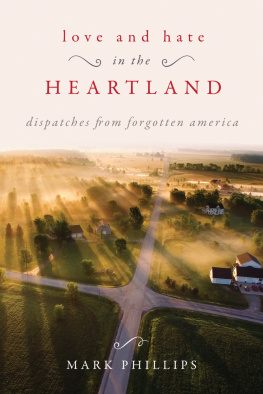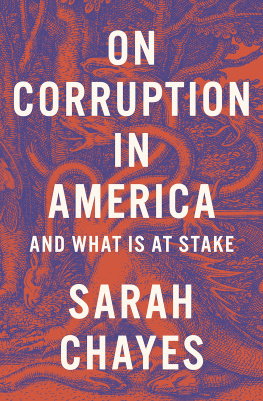Sarah Kendzior - The View from Flyover Country: Dispatches from the Forgotten America
Here you can read online Sarah Kendzior - The View from Flyover Country: Dispatches from the Forgotten America full text of the book (entire story) in english for free. Download pdf and epub, get meaning, cover and reviews about this ebook. year: 2018, publisher: Flatiron Books, genre: Politics. Description of the work, (preface) as well as reviews are available. Best literature library LitArk.com created for fans of good reading and offers a wide selection of genres:
Romance novel
Science fiction
Adventure
Detective
Science
History
Home and family
Prose
Art
Politics
Computer
Non-fiction
Religion
Business
Children
Humor
Choose a favorite category and find really read worthwhile books. Enjoy immersion in the world of imagination, feel the emotions of the characters or learn something new for yourself, make an fascinating discovery.

- Book:The View from Flyover Country: Dispatches from the Forgotten America
- Author:
- Publisher:Flatiron Books
- Genre:
- Year:2018
- Rating:4 / 5
- Favourites:Add to favourites
- Your mark:
- 80
- 1
- 2
- 3
- 4
- 5
The View from Flyover Country: Dispatches from the Forgotten America: summary, description and annotation
We offer to read an annotation, description, summary or preface (depends on what the author of the book "The View from Flyover Country: Dispatches from the Forgotten America" wrote himself). If you haven't found the necessary information about the book — write in the comments, we will try to find it.
Sarah Kendzior: author's other books
Who wrote The View from Flyover Country: Dispatches from the Forgotten America? Find out the surname, the name of the author of the book and a list of all author's works by series.
The View from Flyover Country: Dispatches from the Forgotten America — read online for free the complete book (whole text) full work
Below is the text of the book, divided by pages. System saving the place of the last page read, allows you to conveniently read the book "The View from Flyover Country: Dispatches from the Forgotten America" online for free, without having to search again every time where you left off. Put a bookmark, and you can go to the page where you finished reading at any time.
Font size:
Interval:
Bookmark:


The author and publisher have provided this e-book to you for your personal use only. You may not make this e-book publicly available in any way. Copyright infringement is against the law. If you believe the copy of this e-book you are reading infringes on the authors copyright, please notify the publisher at: us.macmillanusa.com/piracy.
FOR THE KIDS
The Audacity of Despair
This is a collection of essays I wrote between 2012 and 2014. It covers topics such as the collapse of the U.S. economy, the abandonment of the American heartland, the loss of opportunities for youth, the rise of paranoia and the erosion of social trust, the soaring cost of living, and the transformation of industries like media and higher education into exploitation schemes for elites. An old adage says to write what you know. As a journalist living in a decayed Midwestern city waitingand waiting and waitingfor the Great Recession to end, that was what I knew.
Now, almost five years after I originally wrote these essays, it is still, unfortunately, what I know.
I did not set out to write a book, and I certainly did not expect this book to become a guide for those struggling to understand what happened to the United States in 2016 and the mass frustration and rifts the election of Donald Trump exposed. I simply wanted to cover what were, at the time, topics very few of my colleagues wanted to discuss: systemic corruption, the breakdown of institutions, and a post-employment economy where you pay to play or you fall through the cracks.
As the industries I worked in kept collapsing, I fell through the cracks myself a few times, and the only consolation from that experience is that the view from the cracks is a lot clearer than the view from above. I was not alone in my frustration, as I watched friends from all walks of lifepeople with education levels ranging from a GED to a PhD, people from all sorts of professions and backgroundsface that same feeling of futurelessness and receive the same empty assurances. The economy is cyclical, experts assured us, in a line that reeked of spin.
At a time when Americans were being continually informed that our crises were overthe wars in Iraq and Afghanistan were ending, we lived in a post-racial society, the good jobs would be back any day nowI saw no improvements on the ground. America had returned to normal, politicians and pundits proclaimed, but normal felt like a crisis. And when you live in a crisis, you write with urgency, because you need problems to be solved.
So in the era of the audacity of hope, I made a case for the audacity of despair.
This is where you may be thinking to yourself, Wow, this is going to be a really depressing book! And it might be, but that never was and is not my intent. One cannot solve a problem until one acknowledges a problem exists. That is the lesson that Americans learned the hard way during the 2016 election and its aftermath.
It is easy, when people feel frightened and abandoned, for a demagogue to exploit those feelings of despair for political gain. It is easy for that demagogue to translate fear into fanaticism, to shift extremism into the mainstream and market it under the guise of populism. By the time buyers remorse hits, a new and more brutal political culture has arisen. A gaslit nation becomes engulfed in flames.
The United States current contentious climate is the flip side of the false promise of hope we saw half a decade ago. In the aftermath of the recession, hope was wielded like a weapon by corporations that lured in desperate Americans with exploitative assurances: work for low wages now and you will be rewarded with a raise later; rack up college debt because a steady job is guaranteed. Hope was flaunted by pundits and politicians safely ensconced in elite coastal enclaves, who impliedwith their endless proclamations that prosperity awaited if you worked for itthat the lack of prospects for the rest of us must be our own fault.
Above all, we were told not to complain. Dont complain about exploitation. Dont complain about discrimination. Dont complain that you feel trapped. Dont complain, because the problem is not realdont complain, because then people will think the problem is you.
Before I began writing about the problems of the United States, I spent my career studying authoritarian states: countries where citizens cannot complain in public because officials will punish them for doing so. Friends of mine living in countries like Azerbaijan and Uzbekistan had been sent to prison for talking about the same issues I wrote about in the United States. They were criminalized for exposing institutional corruption, systemic discrimination, and opportunity-hoarding by elites. Complaining, to me, always seemed like a gift and an obligation, a path to prospective change that one should never take for granted. So in the course of the two years I spent writing these essays, I used the platform I had at Al Jazeera to complain.
My essays went viral, often attracting millions of views despite (or perhaps because of) their bleak subject matter. I heard from readers living in places like St. Louispostindustrial regions where the economy had long bottomed out. I heard from debt-ridden young people struggling to survive in expensive cities where the cost of living had tripled within a decade. I heard from people from all sides of the political spectrum, who disagreed with each other on many issues but shared a common sense of marginalization and betrayal. I also heard from readers who were doing well, but who felt concerned by what I reported. I tended to get two kinds of reactions from my readers: Im so glad someone is finally talking about this, and I had no idea.
In the fall of 2014, I quit Al Jazeera English following Al Jazeeras decision to rebrand itself for an American audience, a decision which, ironically, curtailed my own ability to talk bluntly about problems in America. (The rebranded Al Jazeera America went out of business in early 2016.) I moved on to covering other topics for other outlets. By that time, my own city of St. Louis had become an international symbol of dysfunction following protests against police brutality in Fergusonbut my old essays remained popular. My work served as a disturbing reminder that the political and economic crises I had documented not only remained, but had gotten worse. In 2015 I decided to collect the essays I had written for Al Jazeera, to call the collection The View from Flyover Country, and to sell it on the Internet.
After the 2016 election, The View from Flyover Country became an online bestseller. This was partially due to the fact that I had predicted nearly all developments of the 2016 election and Trumps winmy foresight was an unfortunate by-product of a lifetime spent studying foreign demagogues, along with an intimate understanding of deteriorating conditions in the United States. But my book also became popular because the issues I had started writing about way back in 2012 never lost relevance. They had simmered and then exploded, startling elites who still thought of our country as one of prosperity and possibility. Because I had tracked the death of the American dream in real time, and because I focused on those who suffered, many people turned to my book for an explanation.
Today, the problems I exposed in The View from Flyover Country, which were controversial five years ago, are now a part of mainstream political discourse. This would be a matter of profound relief if I believed the result was that they would be remedied instead of exploited.
Font size:
Interval:
Bookmark:
Similar books «The View from Flyover Country: Dispatches from the Forgotten America»
Look at similar books to The View from Flyover Country: Dispatches from the Forgotten America. We have selected literature similar in name and meaning in the hope of providing readers with more options to find new, interesting, not yet read works.
Discussion, reviews of the book The View from Flyover Country: Dispatches from the Forgotten America and just readers' own opinions. Leave your comments, write what you think about the work, its meaning or the main characters. Specify what exactly you liked and what you didn't like, and why you think so.







